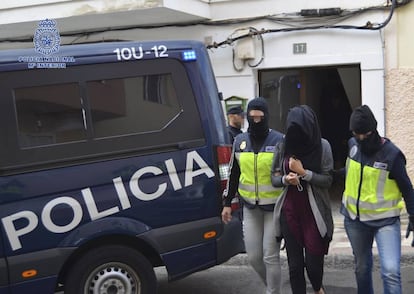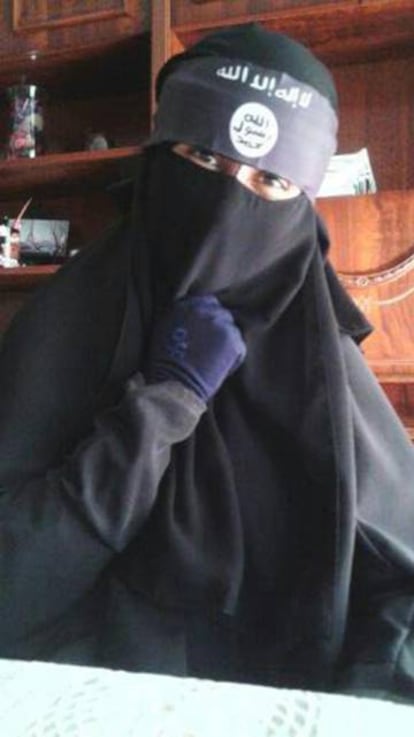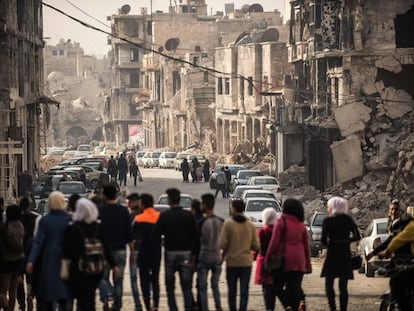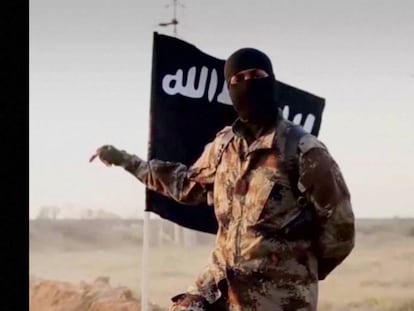How Spanish women are being lured into Jihadism
Islamic terrorism networks have become increasingly clandestine


All of a sudden, the WhatsApp group had no one in it. Its members promptly erased themselves when National Police busted a network of extremists who were attracting around 30 women from the Spanish exclave cities of Ceuta and Melilla in North Africa to either marry or become the sex slaves of Islamic State fighters in August 2014.
Women are targeted with romantic propaganda showing images of heroic Mujahideen and princes
This was Operation Kibera. ¡°It was a real digital scare,¡± says a spokesman from the anti-terrorist unit.
The operation had far-reaching consequences, most recently leading to the arrest in France of a cell sending money to Syria. But the Jihadist networks are growing wise to police tactics and are becoming increasingly good at hiding their activities online, according to investigators.
Last September, Spain's High Court (Audiencia Nacional) dealt with two cases which highlighted the role of women in Jihadist cells. One was Operation Kibera, in which four women and a man named Yawad Mohamed were given prison sentences of up to five years for sending female ¡®volunteers¡¯ to Iraq and Syria as ISIS recruits. The other case jailed two friends, Sanae Boughroum and Laila Haira, for running an indoctrination network.
Both networks were active between 2014 and 2015, after ISIS leader Abu Bakr Al-Baghdadi proclaimed the Islamic State and the terrorist network reached its height in Syria and Iraq.

During that time, Jihadist propaganda and funding was intense and almost 40,000 people, mostly men, left for various conflict zones ¨C around 220 of them were either Spanish or residents in Spain.
The story is very different today. ISIS has lost control of the areas it took and is now struggling to keep control of a handful of strongholds along the Euphrates River between Syria and Iraq, and a few largely deserted areas in both countries.
¡°It¡¯s impossible to go there now,¡± say police sources. ¡°Almost all of those who are there ¨C who are under surveillance ¨C want to come back. Now we are focusing more on the returns than the trips to conflict zones. But getting out of there is not easy. They have to get through a triple filter of Kurdish militias, government forces and the international coalition.
As Islamic State is not a centralized entity, it is difficult for police to ascertain who is in charge of recruiting volunteers. Still, what happens in the conflict zone has an obvious impact on the activities of the cells. In 2012, for example, women rarely traveled to Syria and Iraq. The fighters were predominantly men with military training.
But when the Caliphate was declared, more people started to go out to fight and the numbers of women also multiplied, though according to police analysts, their role was to satisfy the sexual needs of the fighters. By 2015, ISIS was losing ground and women began to fight often in suicide missions.
Women were filmed in palaces to create the illusion they were going to live a life of luxury. In reality, they didn¡¯t even have enough to eat Police source
¡°Islamic State has a vast communications department,¡± says a police spokesman. The Jihadist network generates global content that is then adapted by local ¡°producers¡± according to the country and the gender being targeted.
While men receive more violent content designed to radicalize them faster, the women are given more romantic material, showing heroic Mujahideen or princes they might aspire to marry.
¡°The first women who went out to the conflict zones were filmed in palaces to create the illusion they were going to live a life of luxury. In reality, they didn¡¯t even have enough to eat,¡± says a police source.
The indoctrination network intercepted by Operation Kibera was cleverly designed to identify potential recruits. First, WhatsApp groups of 30 to 40 women were set up and topics of supposed interest to women such as cooking and religion were discussed. Every now and again, a picture of Mujahideen fighters or Israeli attacks on the Palestinian territories would be thrown in and reactions gauged. Those who showed an interest were then contacted individually and subjected to indoctrination sessions to encourage them to go out to the conflict zone.
These communication channels are still active today, according to police sources, though without the level of success they enjoyed in 2014. ¡°The idealization of ISIS four years ago no longer exists,¡± says a police spokesman. ¡°Successive defeats have brought the reality home, but Islamic State can still attract sympathizers and it still has fans that we need to control.¡±
After the Islamic State was declared, many women traveled to conflict zones to fulill the sexual needs of the fighters
Besides being a highly successful propaganda machine, the Jihadist network has legal advisors to help it become familiar with the workings of police investigations and adapt its methods accordingly.
¡°Many of those involved have been ordinary criminals and they are quite precocious. Jihadist ideals carry a lot of weight. Far from preparing them to fit back into society, their time inside increases their aversion to the system. They get to know it and are familiar with its cracks,¡± says one investigator.
In a bid to evade detection, the Jihadist network has channeled its funding away from Western Union and MoneyGram and now uses Hawala, a system that uses intermediaries and avoids having to physically transport the money.
¡°The Jihadist threat is much more clandestine nowadays,¡± says one police chief, who stresses the need to launch a de-radicalization program. ¡°The bad guys know how to hide themselves better, the organizations survive but we are noticing they are becoming more isolated. They are under a lot of social pressure and there is a growing lack of confidence among them. Once we came across a gathering of women discussing cooking and showing each other clothes ¨C all with their faces completely covered. As soon as Jihadism was mentioned, several left the group, something that wouldn¡¯t have happened before.¡±
Police sources indicate that on the border of Jordan, around one in four women coming from a conflict zone asking for political asylum refuse to take off the veil for the police report. ¡°It doesn¡¯t mean they are all terrorists. But they are very radical,¡± says the police chief.
English version by Heather Galloway.
Tu suscripci¨®n se est¨¢ usando en otro dispositivo
?Quieres a?adir otro usuario a tu suscripci¨®n?
Si contin¨²as leyendo en este dispositivo, no se podr¨¢ leer en el otro.
FlechaTu suscripci¨®n se est¨¢ usando en otro dispositivo y solo puedes acceder a EL PA?S desde un dispositivo a la vez.
Si quieres compartir tu cuenta, cambia tu suscripci¨®n a la modalidad Premium, as¨ª podr¨¢s a?adir otro usuario. Cada uno acceder¨¢ con su propia cuenta de email, lo que os permitir¨¢ personalizar vuestra experiencia en EL PA?S.
?Tienes una suscripci¨®n de empresa? Accede aqu¨ª para contratar m¨¢s cuentas.
En el caso de no saber qui¨¦n est¨¢ usando tu cuenta, te recomendamos cambiar tu contrase?a aqu¨ª.
Si decides continuar compartiendo tu cuenta, este mensaje se mostrar¨¢ en tu dispositivo y en el de la otra persona que est¨¢ usando tu cuenta de forma indefinida, afectando a tu experiencia de lectura. Puedes consultar aqu¨ª los t¨¦rminos y condiciones de la suscripci¨®n digital.










































